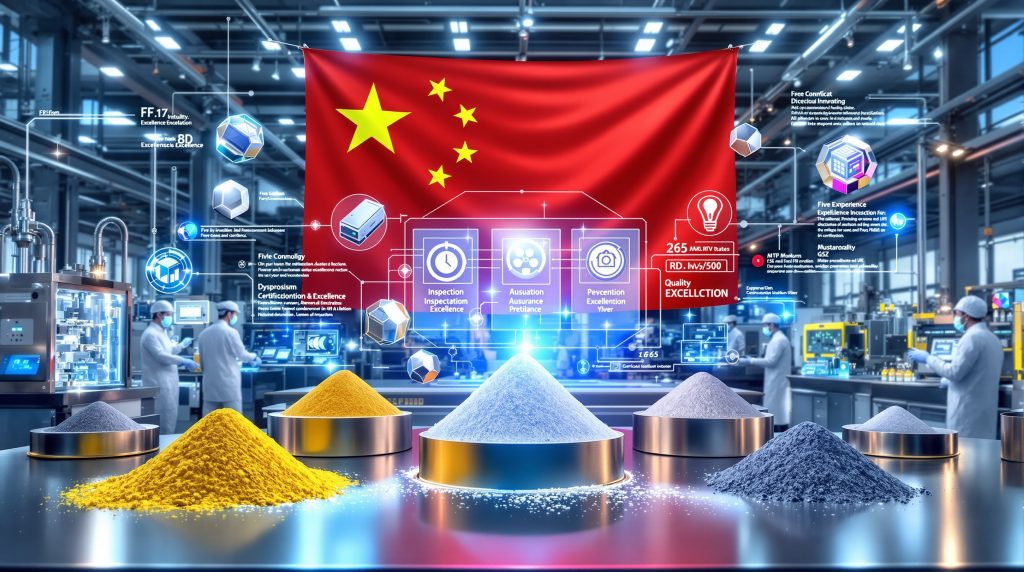Understanding China's National Quality Framework for Critical Materials
China's Ministry of Industry and Information Technology has established a comprehensive five-tier quality management system that serves as the backbone for evaluating manufacturing excellence across critical minerals energy transition sectors. This framework, ranging from Experience through Inspection, Assurance, Prevention, to Excellence classifications, represents a fundamental shift in how China approaches industrial competitiveness in strategic sectors.
The Gansu Rare Earth quality management evaluation demonstrates this system in action. Conducted over two days in late October 2025, the assessment by TÜV/Taier Certification Center under MIIT appointment showcases how China is institutionalizing manufacturing standards that can support global competitiveness, particularly in critical materials where reliability and purity prove decisive.
The Strategic Role of Third-Party Certification
The evaluation process relies on independent third-party assessment through the Telecommunication Metrology Certification Center, also known as TÜV/Taier Certification Center. This organisation operates under direct appointment by provincial departments of industry and information technology, creating a structured pathway between regional oversight and national standards.
Assessment methodology encompasses comprehensive documentation review and operational data analysis, requiring complete organisational transparency across all production processes. The certification framework adapts international quality benchmarks specifically for rare earth processing, establishing measurable performance indicators that align with both domestic policy objectives and global supply chain requirements.
Companies undergoing evaluation must provide extensive documentation covering every aspect of their operations, from production protocols to management systems. This thorough approach ensures that certifications reflect genuine operational capabilities rather than superficial compliance measures. Furthermore, the mining industry innovation trends emphasise the importance of such comprehensive assessment frameworks.
Comprehensive Assessment Architecture for Quality Excellence
The Gansu Rare Earth quality management evaluation operates through a sophisticated four-dimensional assessment structure, each dimension weighted to reflect its strategic importance in overall manufacturing excellence. This systematic approach ensures comprehensive evaluation of organisational capabilities across multiple performance domains.
Four Core Evaluation Dimensions
| Assessment Category | Key Performance Indicators | Strategic Focus Areas |
|---|---|---|
| Quality Management Effectiveness | ISO compliance, process control, defect reduction | Systematic quality assurance protocols |
| Digitisation Integration | Automation implementation, data traceability systems | Technology-driven quality monitoring |
| Organisational Capacity | Staff training programmes, continuous improvement culture | Human capital development |
| Performance Outcomes | Production consistency, customer satisfaction metrics | Measurable results delivery |
The assessment framework evaluates companies across 30 specific indicators distributed throughout these four dimensions. Each indicator represents measurable quality control checkpoints throughout production processes, creating quantifiable performance baselines against established industry standards.
During the October 2025 evaluation, Gansu Rare Earth's leadership, including Deputy Party Secretary and General Manager Zhou Xiaojun, instructed all departments to provide complete cooperation with auditors. This organisational commitment to assessment integrity reflects the strategic importance companies place on achieving higher-tier recognition within China's national quality framework.
Digital Transformation as Quality Foundation
The digitisation dimension carries significant weight in the assessment process, reflecting China's broader industrial modernisation objectives. Companies pursuing Excellence-tier recognition must demonstrate advanced analytical testing capabilities, including precision measurement standards for rare earth element purity and standardised testing methodologies across all production batches.
Real-time quality monitoring systems and automated feedback mechanisms represent essential components of higher-tier certification. These technological requirements ensure that quality management transcends traditional manual inspection methods, incorporating predictive analytics and continuous monitoring protocols that enhance both consistency and reliability.
However, the implementation of data-driven mining operations requires sophisticated technical infrastructure. Third-party evaluators specifically examine the integration of artificial intelligence-powered quality control systems, predictive maintenance protocols for equipment reliability, and comprehensive data traceability throughout production processes. This technological focus demonstrates China's commitment to establishing quality management systems that can compete with the most advanced global manufacturing standards.
Strategic Market Positioning Through Quality Certification
Quality certification within China's national framework provides substantial strategic advantages that extend far beyond operational improvements. Companies achieving Prevention or Excellence ratings gain benchmark enterprise status, positioning them as industry reference points for quality-managed rare earth production.
International Competitiveness and Export Credibility
Certified companies benefit from enhanced international buyer confidence through documented compliance with rigorous national assessment standards. This credibility translates into stronger negotiating positions during global supply chain discussions and potential access to premium pricing opportunities for certified high-quality products.
The certification process addresses critical concerns of international customers regarding Chinese rare earth strategic coordination and material reliability. By establishing measurable quality standards and third-party verification processes, certified companies can demonstrate production consistency that meets demanding applications in electronics, renewable energy, and defence sectors.
Quality management certification creates a documented foundation for long-term international partnerships, enabling suppliers to establish sustained supply agreements based on verified manufacturing capabilities rather than price competition alone.
Supply Chain Integration Benefits
Certified companies experience streamlined quality assurance protocols with downstream manufacturers, reducing the complexity and cost of supplier qualification processes. International customers can rely on certification status as evidence of production reliability, potentially eliminating redundant inspection requirements and accelerating procurement cycles.
The benchmark enterprise designation carries particular significance in global supply chain negotiations. Companies achieving this status influence international quality expectations for rare earth materials, creating competitive advantages that extend throughout the supply chain from production to final application.
Enhanced reliability metrics for critical technology applications represent another substantial benefit. Certified suppliers can provide documented evidence of batch-to-batch consistency and quality performance, addressing the stringent requirements of high-technology manufacturing sectors that depend on reliable rare earth inputs.
Global Market Implications of China's Quality Initiative
The Gansu Rare Earth quality management evaluation reflects broader strategic shifts within China's approach to industrial competitiveness. This transformation from quantity-focused to quality-focused production represents a fundamental evolution in how China positions itself within global critical materials markets.
China's Quality-Driven Industrial Strategy
The national quality management framework aligns directly with China's Quality Strong Nation Construction Outline, a comprehensive policy initiative designed to enhance industrial competitiveness through systematic quality improvements. This strategic framework demonstrates Beijing's recognition that future competitive advantages will depend on manufacturing excellence rather than production volume alone.
Integration with new industrialisation objectives emphasises sustainable manufacturing practices and technology-driven quality assurance systems. The evaluation process ensures that companies developing within this framework can meet increasingly sophisticated international requirements whilst maintaining cost competitiveness in global markets.
The systematic approach to quality management creates institutional knowledge that can be replicated across China's critical materials sector. Companies achieving higher-tier certifications become reference points for industry best practices, spreading quality improvement methodologies throughout the domestic supply chain. In addition, 3D geological modelling technologies support these comprehensive assessment approaches.
International Standards Influence
China's quality certification framework potentially influences global benchmarks for critical materials manufacturing. As the dominant global supplier of rare earth elements, Chinese quality standards increasingly affect international expectations for material purity, consistency, and reliability.
The comprehensive assessment methodology, covering digitisation integration and organisational capacity alongside traditional quality metrics, establishes a holistic approach to manufacturing excellence that may influence international quality standards development. This broad framework addresses not only product quality but also process reliability and organisational sustainability.
Companies achieving Excellence-tier recognition within this system gain credibility that extends beyond China's domestic market. International buyers increasingly recognise Chinese quality certifications as legitimate indicators of manufacturing capability, potentially reducing the need for separate international certification processes.
Technical Excellence Requirements for Premium Certification
Achieving Excellence-tier recognition within China's national quality management framework demands sophisticated technical capabilities that extend significantly beyond traditional quality control measures. These requirements reflect China's commitment to establishing world-class manufacturing standards for critical materials production.
Advanced Quality Control Technologies
Excellence-tier certification requires implementation of precision measurement standards for rare earth element purity that meet or exceed international specifications. Companies must demonstrate standardised testing methodologies across all production batches, ensuring consistent analytical results regardless of production timing or equipment variations.
Real-time quality monitoring systems represent essential infrastructure for premium certification levels. These systems must provide continuous oversight of production parameters, with automated feedback mechanisms that can adjust processes immediately when quality variations are detected. This technological approach eliminates the delays inherent in traditional sampling and testing methodologies.
The assessment framework specifically evaluates AI in mining operations implementation within quality control systems. Companies pursuing Excellence-tier recognition must demonstrate AI-powered analytics capabilities that can predict quality variations before they occur and recommend preventive adjustments to maintain production consistency.
Digital Manufacturing Integration
Comprehensive data traceability throughout production processes represents a fundamental requirement for premium certification. Companies must maintain complete digital records of all production decisions, material inputs, process parameters, and quality measurements, creating an auditable trail that supports both quality assurance and continuous improvement initiatives.
Predictive maintenance protocols for equipment reliability form another critical component of Excellence-tier requirements. Rather than reactive maintenance approaches, certified companies must implement forward-looking maintenance strategies that prevent equipment failures and maintain consistent production quality over extended periods.
Consequently, the digitisation assessment examines integration between quality management systems and broader production management infrastructure. Excellence-tier companies must demonstrate seamless information flow between quality monitoring, production planning, and supply chain management systems, creating organisational capabilities that support sustained quality excellence.
Industry Benchmark Analysis and Competitive Positioning
Understanding the Gansu Rare Earth quality management evaluation requires context within China's broader rare earth industry landscape. As an affiliate of Baotou Iron and Steel Group, the company operates within an established industrial framework that includes multiple rare earth processing entities.
Regional Quality Development Trends
China's rare earth sector encompasses numerous companies across different geographical regions, each developing quality management capabilities at varying rates. The national evaluation framework creates standardised assessment criteria that enable direct comparisons between companies regardless of their operational locations or parent organisations.
Baotou Iron and Steel Group's involvement in quality management initiatives extends beyond Gansu Rare Earth, potentially creating synergies between affiliated companies pursuing similar certification objectives. This organisational approach may accelerate quality improvement implementation across multiple production facilities.
Furthermore, the regional concentration of rare earth processing in specific provinces creates opportunities for knowledge sharing and best practice development. Companies achieving higher certification tiers can serve as regional reference points, supporting industry-wide quality improvements through collaborative learning and shared expertise.
Performance Measurement Evolution
The transition toward comprehensive quality management systems represents a significant evolution from traditional production-focused metrics. Companies now must demonstrate excellence across multiple dimensions simultaneously, requiring organisational capabilities that extend far beyond basic production competency.
Investment requirements for achieving Excellence-tier certification include substantial technological upgrades, staff training programmes, and process documentation systems. The return on investment for these quality improvements extends beyond certification benefits to include operational efficiency gains and reduced defect rates.
Timeline expectations for quality transformation vary depending on companies' existing capabilities and organisational readiness. However, the comprehensive nature of the assessment framework suggests that meaningful quality improvements require sustained commitment over multiple years rather than short-term compliance efforts.
Future Supply Chain Reliability and Market Evolution
The implications of China's quality management initiatives extend well beyond individual company certifications to influence global supply chain reliability and market dynamics. These changes affect international manufacturers, technology companies, and strategic material consumers worldwide.
Enhanced Material Consistency Standards
Quality certification programmes specifically target variability reduction in rare earth element concentrations, addressing one of the primary concerns international buyers express regarding Chinese suppliers. Standardised production processes and real-time monitoring systems work together to minimise batch-to-batch variations that can disrupt downstream manufacturing processes.
Improved reliability metrics for critical technology applications emerge from comprehensive quality management systems that establish measurable performance baselines and continuous monitoring protocols. These improvements particularly benefit high-technology sectors where material consistency directly affects product performance and reliability.
The focus on quality assurance for demanding manufacturing applications reflects China's strategic objective to support domestic high-technology industries whilst maintaining competitiveness in international markets. Certified suppliers can provide the material consistency required for advanced applications in semiconductors, permanent magnets, and energy storage systems.
Long-Term Market Transformation
Quality certification creates potential for premium pricing structures within rare earth markets, differentiating certified suppliers from non-certified competitors based on verified quality capabilities rather than price competition alone. This market evolution benefits companies investing in quality improvement whilst encouraging industry-wide upgrades.
Increased international customer confidence in certified Chinese suppliers may lead to longer-term supply agreements and strategic partnerships. International manufacturers gain supply chain stability through relationships with suppliers demonstrating sustained quality commitment, whilst certified suppliers benefit from predictable demand and premium pricing opportunities.
The influence on global rare earth quality standards development represents a long-term strategic benefit for China's rare earth industry. As international buyers become familiar with Chinese certification standards, these frameworks may influence global quality expectations and procurement criteria across the critical materials sector.
Strategic Sourcing and International Procurement Strategies
International companies sourcing rare earth materials can leverage China's quality certification developments to enhance their own supply chain reliability and risk management capabilities. Understanding the certification framework enables more sophisticated supplier evaluation and strategic sourcing decisions.
Due Diligence and Supplier Assessment
Incorporating MIIT quality ratings into supplier evaluation criteria provides objective, third-party verified evidence of manufacturing capabilities and quality system maturity. International buyers can use certification levels as standardised benchmarks for comparing potential suppliers across multiple performance dimensions.
The comprehensive assessment framework covering effectiveness, digitisation, organisational capacity, and performance outcomes offers international buyers detailed insights into supplier capabilities beyond traditional quality metrics. This information supports more informed sourcing decisions and risk assessment procedures.
Documentation requirements associated with certification provide international buyers access to verified operational data that can inform supply chain planning and quality assurance protocols. Certified suppliers offer transparency levels that reduce procurement risk and support long-term partnership development. For instance, research conducted by Gansu Rare Earth Testing Center demonstrates advanced analytical capabilities that support such transparency initiatives.
Quality Integration and Risk Management
Balancing cost considerations with quality certification benefits requires sophisticated procurement strategies that evaluate total cost of ownership rather than initial purchase prices alone. Certified suppliers may command premium pricing, but their enhanced reliability can reduce downstream quality control costs and supply chain disruptions.
Long-term partnership opportunities with certified suppliers enable international companies to develop strategic relationships based on verified quality capabilities and continuous improvement commitments. These partnerships can provide supply chain stability and access to advanced materials development programmes.
Quality assurance integration between certified Chinese suppliers and international manufacturing standards creates opportunities for streamlined quality control processes and reduced inspection requirements. International companies can leverage supplier certifications to optimise their own quality management systems and regulatory compliance procedures. Additionally, comprehensive research on rare earth environmental considerations supports sustainable procurement strategies.
Disclaimer: This analysis is based on publicly available information and industry developments. Readers should conduct independent verification of quality certifications and supplier capabilities when making procurement decisions. Market conditions and regulatory frameworks may change, affecting the relevance of quality certifications to specific sourcing requirements.
Seeking Strategic Advantages in Critical Materials Markets?
Discovery Alert's proprietary Discovery IQ model delivers real-time alerts on significant ASX mineral discoveries, instantly empowering subscribers to identify actionable opportunities ahead of the broader market. Begin your 30-day free trial today and secure your market-leading advantage with Discovery Alert.




